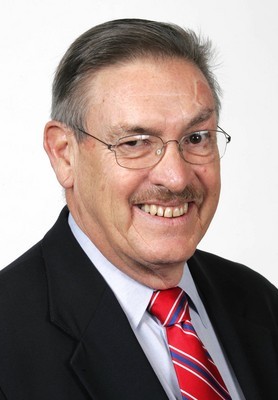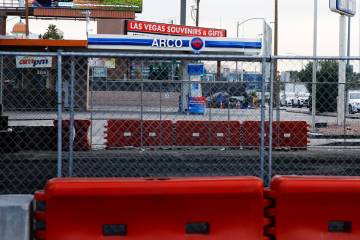Initiative backers dismiss resistance
Proponents of two ballot initiatives that ask voters to reallocate hotel room tax dollars away from the Las Vegas Convention and Visitors Authority might not be finding much support.
The convention authority and every municipality in Clark County filed a lawsuit late Thursday to stop the ballot questions. But representatives from most of the major casino corporations also have already voiced opposition to the plan.
Gaming leaders said they don't want to divert money used to market Las Vegas at a time when massive expansion is taking place on the Strip and a national economic downturn is curtailing the tourism activities of Americans.
"My position and the position of our company is we can not support any type of initiative that takes so much away from the convention authority so that it would not be able to accomplish its mission," said Station Casinos Executive Vice President Scott Nielson, a member of the convention authority's board of directors. "We believe in the mission of the LVCVA."
MGM Mirage Executive Vice President Chuck Bowling, also a member of convention authority's 14-person board, said his company has maintained a long-standing opposition against taking money away from tourism support.
"Our model is so successful that other communities are beginning to look at it," Bowling said. "Certainly, this is not the time to throw out our plan."
Those kinds of opinions don't concern former state Treasurer Bob Seale, who is circulating two petitions on file with the secretary of state's office that he is hoping to qualify as initiatives for the November ballot.
If approved, the initiatives would transfer room taxes from tourism support to help fund either public education or public safety improvements.
Seale expected opposition. But he doesn't believe the initiatives would keep the convention authority from promoting Las Vegas.
"I really disagree with that analysis," Seale said. "Their role will not diminish. They will still have adequate dollars to accomplish their goals. I believe (the initiatives) are good public policy."
The convention authority, joined by the cities of Las Vegas, North Las Vegas, Henderson, Boulder City and Mesquite and Clark County, filed a lawsuit in Carson City District Court to block the petition. The municipalities all have representatives on the convention authority's board.
Las Vegas Mayor Oscar Goodman, who serves as chairman of the convention authority board, said he supported the lawsuit because the initiatives would divert hotel room tax dollars away from local governments as well as the tourism organization.
The lawsuit claims the two initiatives would violate a 2005 state law that requires petitions to deal with a single subject. That argument was used recently by the Nevada Resort Association to prevent the circulation of petitions calling for an increase in the state gaming tax.
Seale filed the petitions on Feb. 29, saying the money would pay for needed improvements without raising taxes. The lawsuit also claims Seale is acting on behalf of the Las Vegas Sands Corp., whose executives have had a long-running feud with the convention authority and its operation of the Las Vegas Convention Center. Seale said he wanted to become involved in the petition drive after hearing the idea proposed in a speech by Las Vegas Sands President Bill Weidner.
Representatives of several casino companies said they were approached by Las Vegas Sands officials about the potential initiatives before the petitions were filed. Gaming executives said they were willing to sit down and discuss the matter with Las Vegas Sands officials, but that should not constitute support for the idea.
Robert Uithoven, a Las Vegas Sands political consultant, said the company is part of a coalition supporting Seale's initiatives.
"Our role is providing some assistance, advocating for its passage and assisting with the coalition-building behind it," he said. "We have a very strong team of supporters backing it."
Uithoven said the lawsuit did not come as a surprise, and argued that it only bolstered the argument for the initiatives.
"I believe that the LVCVA thought they were being clever by having a bunch of local governments sign off as plaintiffs in this lawsuit, but really, it only serves to make our point," Uithoven said. "Of course government is going to sue to resist the people's right to petition and reform government. Government by its nature doesn't reform itself; it takes the people to accomplish reform. We believe taxpayers in Nevada want an alternative to having their taxes raised."
During the 2007 legislative session, Las Vegas Sands executives, with the backing of Gov. Jim Gibbons, lobbied to have room taxes taken away from the convention authority and be used to fund transportation improvements.
In the end, a compromise was reached in which the convention authority agreed to give up $20 million a year over the next 30 years to fund road improvements to Interstate 15 through the resort corridor.
In addition to MGM Mirage and Station Casinos, representatives of Harrah's Entertainment, Wynn Resorts and Boyd Gaming Corp. are members of the convention authority's board.
Bowling said the current market conditions mean tourism marketing must be elevated to ensure visitation continues to grow. MGM Mirage has 10 Strip resorts and is building the nearly $8.4 billion CityCenter development.
"We're the biggest player in town, but the LVCVA serves a much broader base," Bowling said. "The success of the entire community is based on how the LVCVA performs. We just shouldn't mess with that model."
Room tax rates now average 9 percent in Clark County. According to the convention authority, room taxes collected in fiscal year 2007 were more than $397.7 million. Of that total, the convention authority used 47 percent of the total, or $191.9 million, while 53 percent, or $205.8 million, went into total community support, including $72.6 million that was distributed to the Southern Nevada municipalities.
The convention authority has projected room taxes will reach $456.3 million in fiscal 2009 and $571.8 million by 2012.
Contact reporter Howard Stutz at hstutz@reviewjournal.com or (702) 477-3871. Review-Journal reporter Molly Ball contributed to this article.




























